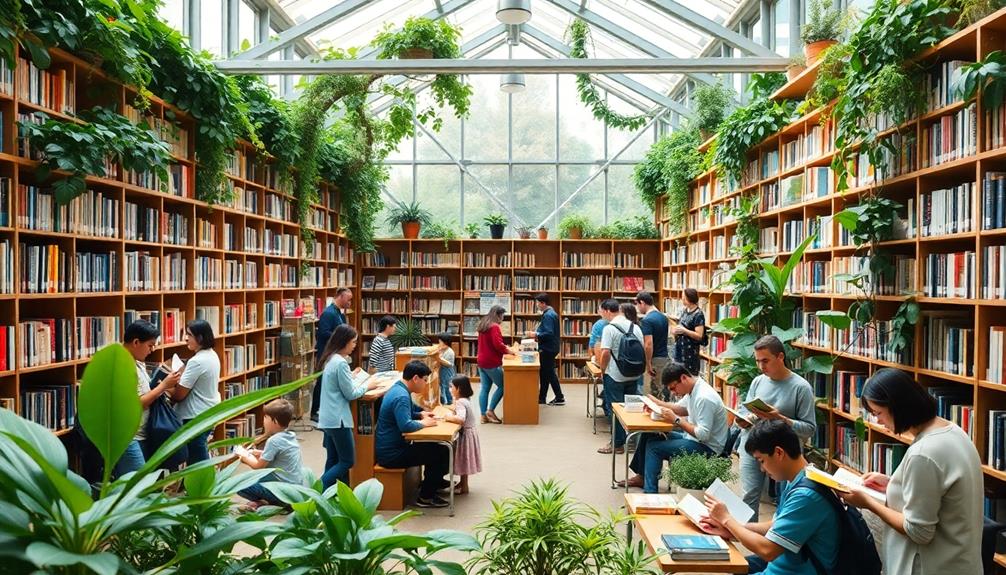To build a habit of lifelong learning through curiosity, start by asking questions and embracing new experiences. Challenge yourself to step out of your comfort zone and explore diverse topics; this ignites your passion for knowledge. Set aside dedicated time weekly for learning, whether through workshops, travel, or hobbies. Maintain a growth mindset, viewing obstacles as opportunities to learn. Surround yourself with supportive environments that encourage curiosity and collaboration. Reflect regularly on your learning journey to assess progress and adjust your goals. As you enhance your curiosity, you'll discover even more ways to fuel your learning adventure.
Key Takeaways
- Cultivate a growth mindset by embracing challenges and viewing failures as opportunities for learning rather than setbacks.
- Set aside dedicated time each week for exploring new topics or hobbies to nurture curiosity and personal growth.
- Engage with diverse subjects and disciplines to foster innovation and develop versatile thinking skills.
- Regularly reflect on your learning experiences and maintain a journal to reinforce retention and clarify goals.
- Create a supportive learning environment by encouraging open dialogue, sharing resources, and celebrating achievements with others.
Understanding Lifelong Learning

Understanding Lifelong Learning
Lifelong learning, both in and out of formal settings, is a journey that enriches your life at every stage. It's not just about earning degrees or attending classes; it's a continuous process that weaves through your personal experiences and self-directed education.
By embracing lifelong learning, you open yourself up to countless opportunities for growth that enhance your personal development and boost your self-esteem. Engaging in practices that promote an abundance mindset can markedly expand your learning horizons and foster a deeper sense of fulfillment.
Adopting a growth mindset is essential here. When you believe in your ability to develop skills and knowledge through effort and persistence, you cultivate curiosity and resilience in the face of challenges. This adaptability allows you to navigate the rapidly evolving technological and societal landscapes with confidence.
Moreover, committing to lifelong learning keeps your mind active, which is vital for maintaining mental fitness and reducing cognitive decline as you age. Each new skill or piece of knowledge you acquire adds depth to your understanding and contributes to a greater sense of purpose and satisfaction in life.
Cultivating Curiosity

Curiosity is a powerful catalyst for learning that can transform your approach to the world. By fostering a curious mindset, you can enhance your understanding and dive deeper into various subjects. Engaging with curiosity aligns with the principles of the Law of Attraction as it encourages positive thinking and the pursuit of personal growth.
Here are three ways to cultivate curiosity:
- Ask Questions: Regularly engage in questioning everything around you. This habit encourages exploration and leads to new insights.
- Embrace Uncertainty: Being open-minded allows you to reflect on diverse perspectives, which is essential for personal development and lifelong learning.
- Challenge Your Comfort Zone: Seek out new experiences that push your boundaries. This stimulation not only broadens your knowledge but also keeps your mind actively engaged.
Curiosity not only enhances your learning but also triggers dopamine release in your brain, making the process enjoyable.
Benefits of Lifelong Learning

Embracing a curious mindset naturally leads to the many benefits of continuous learning throughout your life. Lifelong learning enhances your personal growth by increasing self-awareness and sparking new interests, which contributes to overall life satisfaction.
Engaging in continuous education not only boosts your employability but also aligns with the evolving demands of industries influenced by advanced AI technologies. As companies today prioritize skills acquisition over formal qualifications, making lifelong learners more competitive in the job market.
Moreover, lifelong learning strengthens your mental fitness. By consistently acquiring new skills, you keep your mind active, reduce stress, and increase cognitive flexibility. This constant engagement fosters critical thinking, allowing you to approach challenges with a fresh perspective.
Adaptability is another significant advantage. In a rapidly changing world, the diverse knowledge you gain equips you to thrive, helping you navigate new situations with ease. Lifelong learning also opens up opportunities for social connections and collaboration, leading to greater mental engagement and overall well-being.
Ultimately, committing to a habit of lifelong learning enriches your life, providing you with the tools you need to grow, adapt, and succeed in both personal and professional spheres.
Strategies for Continuous Learning

To embrace new experiences, step outside your comfort zone and try activities or hobbies you've never considered before.
Engaging in open dialogue with others can also spark fresh ideas and perspectives that enhance your learning journey.
Embrace New Experiences
Stepping outside your comfort zone can open doors to new experiences that enhance your lifelong learning journey. Embracing new experiences not only fuels curiosity but also promotes personal growth.
Here are three ways to get started:
- Try a New Hobby: Pick up an activity you've never done before, like painting, dancing, or coding. This can help you learn new skills and ignite your passion for exploration.
- Travel to Unfamiliar Places: Whether it's a new city or a different country, traveling exposes you to diverse perspectives and cultures, enriching your understanding of the world.
- Participate in Workshops: Attend local seminars or community events to meet like-minded individuals and share knowledge. These interactions can spark innovative ideas and enhance your learning.
Regularly challenging yourself to explore different topics will keep your brain adaptable and improve cognitive function.
The more you engage in experiences that push you outside your comfort zone, the more you cultivate a habit of lifelong learning. Embrace these opportunities, and watch as your curiosity and skills flourish!
Foster Open Dialogue
Open dialogue acts as a catalyst for continuous learning, creating an environment where diverse perspectives flourish. When you foster open dialogue, you encourage the exchange of diverse viewpoints that enhance critical thinking. Engaging in discussions about various topics leads to unexpected insights and stimulates curiosity, forming a culture where continuous learning is valued.
To promote this atmosphere, you should actively ask questions during conversations. This practice helps you explore deeper meanings and nurtures a growth mindset, which is essential for lifelong learning. As you engage with others, celebrate their contributions and ideas. Recognizing these inputs reinforces a supportive atmosphere, motivating everyone to share knowledge and learn from one another.
Moreover, implementing regular feedback mechanisms in your discussions can help identify blind spots and promote collective growth. This makes learning a collaborative process, where everyone benefits from shared insights.
Overcoming Learning Barriers

To build a habit of lifelong learning, you first need to identify the personal obstacles that hold you back.
Time management plays a vital role here; finding effective strategies can help you make learning a consistent part of your life.
Identifying Personal Obstacles
Many learners face considerable personal obstacles that can hinder their journey toward lifelong learning. Recognizing these barriers is the first step toward overcoming them. Here are three common obstacles:
- Overwhelm: The sheer volume of information can be intimidating. Breaking your learning goals into manageable steps can make the process more approachable.
- Fear of Failure: This fear often prevents you from taking risks. Instead of avoiding mistakes, embrace them as essential learning opportunities that foster resilience and curiosity.
- Fixed Mindset: If you see your abilities as static, you may limit your growth. Cultivating a growth mindset values effort and views learning as a lifelong journey.
Creating a supportive learning environment can greatly enhance your personal growth. Engage in open dialogue with others who share your interests. This not only reduces the fear of judgment but also encourages exploration.
Time Management Strategies
How can effective time management transform your approach to lifelong learning? By implementing smart time management strategies, you can prioritize your learning and make it a consistent part of your life.
Start by dedicating specific time slots each week for learning activities, treating these appointments as non-negotiable for your personal growth.
Incorporate time-blocking techniques to create focused periods for learning, minimizing distractions and enhancing productivity. Break down your learning goals into smaller, manageable tasks to prevent feeling overwhelmed. This not only keeps motivation high but also fosters a sense of accomplishment along the way.
Leverage technology and apps to set reminders and track your progress, which helps maintain accountability in your lifelong learning journey.
Additionally, consider combining learning with your daily routines. For instance, listen to educational podcasts during your commute or read articles during breaks. This approach maximizes time efficiency while fueling your curiosity.
Engaging With Diverse Topics

In today's fast-paced world, engaging with diverse topics is vital for fostering cognitive flexibility and innovative thinking. When you expose yourself to various fields, you not only broaden your knowledge but also enhance your curiosity and adaptability.
Here are three reasons to immerse yourself in diverse topics:
- Cross-Disciplinary Connections: Engaging with different subjects allows you to connect ideas and innovate, leveraging insights from various domains.
- Skill Enhancement: Participating in workshops across diverse areas keeps your skills updated, encouraging collaboration that sparks new ideas.
- Cultivating Curiosity: Reading widely from various genres introduces new concepts that challenge your beliefs and stimulate your desire to learn.
Exploring unfamiliar topics keeps your curiosity alive and equips you with adaptability, an essential skill in an ever-evolving job market.
By consistently engaging with diverse topics, you'll not only cultivate a habit of lifelong learning but also become more versatile in your thinking and problem-solving abilities.
Reflection and Mindfulness

Cultivating a habit of reflection and mindfulness greatly enhances your lifelong learning journey. By regularly reflecting on your daily experiences, you boost self-awareness and gain a clearer understanding of your personal learning goals. This deeper insight leads to more effective lifelong learning practices.
Mindfulness techniques, like meditation, sharpen your focus and clarity, making it easier to absorb new ideas. Journaling your learning experiences reinforces retention and serves as a platform for evaluating progress. Ask yourself reflective questions such as, "What did I learn today?" or "How can I apply this knowledge?" This fosters a habit of continuous inquiry.
Here's how reflection and mindfulness impact your learning:
| Aspect | Benefit |
|---|---|
| Self-Awareness | Enhances understanding of goals |
| Continuous Inquiry | Encourages exploration and growth |
| Stress Reduction | Creates mental space for curiosity |
Creating a Supportive Environment

A supportive environment is crucial for fostering a culture of lifelong learning. When you create spaces that encourage curiosity and collaboration, you're paving the way for continuous exploration.
Here are three key aspects to reflect on:
- Open Dialogue: Encourage diverse viewpoints to stimulate discussion and idea-sharing.
- Learning Resources: Incorporate books, puzzles, and educational games to engage learners creatively.
- Celebrate Achievements: Recognize curiosity-driven successes to reinforce the importance of exploration.
By fostering open dialogue, you not only promote knowledge sharing but also build resilience through experimentation and risk-taking.
It's essential to create platforms where individuals can collaborate and exchange resources, enhancing collective growth within your community.
As you design your environment, make sure it's filled with various learning resources that spark interest and engagement.
Frequently Asked Questions
What Is the Role of Curiosity in Lifelong Learning?
Curiosity plays an essential role in lifelong learning by sparking your desire to explore and understand the world around you.
It drives you to ask questions and seek new experiences, making learning enjoyable and rewarding.
When you're curious, your brain releases dopamine, enhancing your ability to absorb information.
Embracing curiosity helps you overcome fears and complacency, allowing you to grow and adapt while broadening your perspectives and knowledge.
How Does Curiosity Help in Learning?
Imagine curiosity as a curious cat, always exploring new corners and discovering hidden treasures.
When you embrace curiosity, you engage your mind like that cat, igniting your brain's reward system and making learning more enjoyable.
You'll find yourself seeking diverse experiences, enhancing your understanding and problem-solving skills.
This intrinsic motivation keeps you committed to learning, allowing you to tackle challenges with an open mind and adapt to new information like a nimble feline.
How Do You Create a Lifelong Learning Habit?
To create a lifelong learning habit, start by setting clear, specific goals that guide your journey.
Dedicate time each day to explore new topics, making learning a routine part of your life.
Embrace challenges as opportunities for growth, and utilize diverse resources like online courses and podcasts to keep your curiosity alive.
How Do You Develop a Lifelong Learning Mindset?
Did you know that 94% of employees say they'd stay at a company longer if it invested in their learning?
To develop a lifelong learning mindset, embrace curiosity and seek new experiences. Challenge yourself to explore diverse subjects, and don't shy away from feedback—it's a powerful tool for growth.
Regularly reflect on what you learn and create an environment that encourages questioning. By doing this, you'll naturally cultivate a passion for continuous learning.
Conclusion
In today's fast-paced world, embracing lifelong learning through curiosity isn't just a nice-to-have; it's essential for your growth. By cultivating a habit of exploration and engaging with diverse topics, you'll keep your mind sharp and your skills relevant. Remember, it's never too late to be a lifelong learner—just like a smartphone keeps updating, so can you! So, stay curious, reflect often, and create a supportive environment that fuels your journey toward continuous learning.









